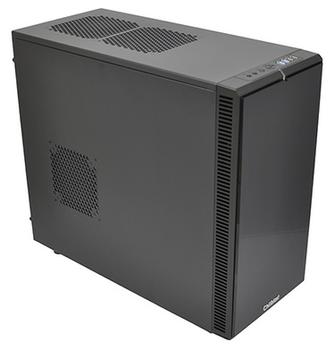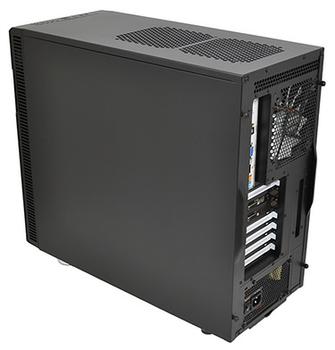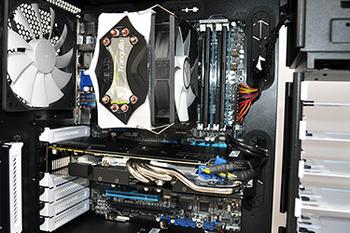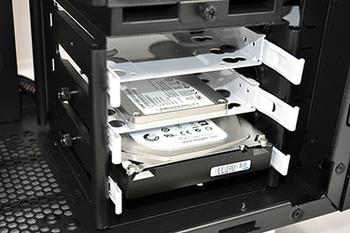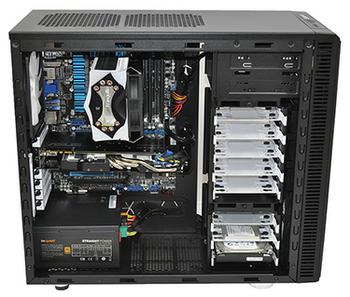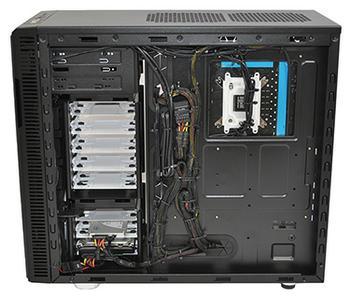Introduction
System integrators are having to think long and hard on how best to build today's high-end gaming machines. Rip-roaring rigs that tout speed at the expense of all else aren't to everyone's liking, and low-power, ultra-quiet, sleek systems are becoming increasingly popular.
Take the recently reviewed Chillblast Fusion Voodoo SLI as an example. It offers enough oomph to make most competing systems tremble in fear, but the extreme configuration didn't tick all the right boxes; we found it too loud and power hungry for our liking, and in our conclusion we wished that "Chillblast had done more to tame this particular beast."
Those comments haven't fallen on deaf ears as the Wimborne-based system builder followed up by sending us the Chillblast Fusion Stealth:
This £1,200 build looks lovely and sleek, yet it has a lot in common with the aforementioned Voodoo SLI. The Stealth machine makes use of the same motherboard (an Asus P8Z77-V), it sports the same Intel Core i5-3570K processor (though overclocked at 4.3GHz, not a lofty 4.7GHz) and continues to carry 16GB of Corsair Vengeance LP memory.
The foundation is almost identical, but Chillblast has shuffled the rest of the system's make-up in an effort to make it quieter and more efficient. To that end, an ultra-quiet Gelid Tranquillo is used for CPU cooling duties, a 680W be quiet! Straight Power PSU powers the system, and a single Asus GeForce GTX 670 DirectCU II graphics card is in place for gameplay duty.
Asus's card offers a tremendous amount of 3D horsepower, yet it also boldly claims to be the "coolest and quietest 28nm card." Such criteria are key to the Stealth's ambition, and each component appears to have been carefully selected for low-noise-yet-capable performance.
As expected for any modern-day build, an SSD is configured for primary storage duties, with Chillblast's base configuration including a 120GB Intel 330 Series drive. Upgrading to a larger 240GB Intel SSD costs more than it should (an extra £100) and though a 2TB secondary hard disk is installed as standard, Chillblast's configuration page currently has no option to remove the hard disk altogether. Optical disc support, meanwhile, is provided by an LG Blu-ray drive that doubles as a DVD writer.
Chillblast's entire package is wrapped in a soundproofed Fractal Design Define R4 chassis - a favourite around these parts - though it's a shame Corsair's Obsidian Series 550D isn't available as an optional configuration choice. We've no qualms with the Define R4, mind you, its built-in fan controller makes it an excellent choice for a sleek, quiet-running system, and Chillblast puts it to good use with high-quality component installation.
Our evaluation system arrived without a fingerprint in sight, and good cable management results in the rig looking tidy throughout. If there's a criticism, it's that Chillblast has been overeager in the use of cable ties. Having to undo or re-route any of the pictured cables would require some effort, and we'd prefer to see a couple of cables clipped into place for extra flexibility. Curious, also, that Chillblast has opted not to install the 2.5in SSD on the rear of the motherboard tray - it's an option available to the Define R4 chassis, but the company seems to prefer using the dedicated drive bays.
We're struggling to find any real criticisms, as Chillblast's component selection is almost exactly in line with what we would choose if we were tasked with specifying a £1,200 system. Cash-strapped consumers may find the asking fee tough to stomach, particularly for a base-unit-only configuration, but Chillblast's price tag is technically spot on; buying all of the components individually from a popular UK retail outlet would cost £1,180. For very little extra, Chillblast is neatly putting the system together, overclocking the CPU to a modest 4.3GHz, delivering it to your door and providing a two-year collect-and-return warranty.
Seems a good deal, but does the Fusion Stealth pack enough of a punch to warrant the price, and, just as importantly, is it as quiet as it's made out to be?



